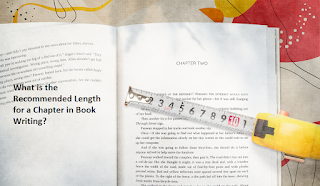You probably have many questions about
where and how to start writing your book. Many professional book writers
wonder, "How many chapters should I include in my book?" Pre-planning
and plotting can help. The relevance of chapters and their length in a book
helps address this question many prospective authors have.
How Many Chapters
Should a Book Have?
Unfortunately, the question has multiple
answers. Twelve chapters are typical for a book, regardless of genre or
readership. The number of chapters in a book is not fixed. You can either go
conventional with 10–20 chapters or experimental with 150 chapters. Chapters are
the only places where the author breaks the story.
Even among books with comparable subjects
and audiences, some famous works vary in length and chapter count. The Hunger
Games has 27 chapters and 99,750 words, while Harry Potter's first volume had
17 chapters and 77,000 words.
Remember that your book will have a set
number and length of chapters. Consider these variables when choosing the
number of chapters for your book:
Books Types that
Required Chapters
Before choosing how many chapters to
include in your book, you must understand why. They're not necessary, but they
can help structure the story for reader comprehension. After each chapter, room
is sufficient to allow the reader to reflect on what they read. Since it's not
always possible to finish a book in one sitting, they allow readers to rest and
do other things. You must compose a chapter so they won't be overjoyed and
unwilling to read the next one when they return.
Thus, dividing your work into chapters
ensures that readers are content with the previous chapters and desire to learn
more in the next. Only the final book chapter should complete a story. Think
twice before presenting difficulties that won't be handled in the next chapter
to avoid disappointing readers and having them put the book down.
Books that
Require Chapters
Due to additional breaks, longer novels
will likely contain more chapters. What about writing a short story? Shorter
texts are ideal for testing flow and pacing and practicing writing and
chaptering. Short stories—1,000–7,000 words—rarely have chapters. They
occasionally change scenes and pauses to indicate plot or locale changes.
Although novellas are limited to 20,000
words, they are longer than short stories. You can divide it into chapters or
omit them for pauses, like a short story. The novella's length and number of
characters will most affect this decision.
Duration of each scene. Chapters can help you write nonfiction, fiction,
development, or business books. A cookbook could have dessert or Spanish
cuisine chapters.
When Should Your
Story Have Chapters?
Now that you know why chapters are needed,
when should you split your text? Should you decide while outlining? Want to
wait for the second draft?
Book writing is unstandardized. Although
some strongly advise against writing without planning. Some say you shouldn't
consider chapters until you have a good first draft.
Thus, your writing style will determine
what works best; however, the following strategies should be considered:
First, Finish Your
Manuscript
You can divide your book into chapters by
writing it as a draft and then dividing it into chapters that make sense. This
will benefit some more than others, especially those who prefer to write on the
go or with experimental or zero drafts.
This strategy lets you produce a first
draft without thinking about chapter breaks. You can then reread and mark break
points. This may follow important scenes. Consider places when certain reader
queries are answered, but there is still enough suspense. Even though chapter
breaks can build tension and keep readers on edge, you don't have to end each
chapter with a cliffhanger.
Look for natural pauses in the story to
place chapter breaks. A major story point may have finished. Maybe your
protagonist's new information will influence the plot. A chapter break works
everywhere and lets readers reflect on what they read.
Create Outline
Chapters
If you outline and think, consider
chaptering your story before writing the first draft. This strategy is ideal
for those who enjoy comprehensive outlines.
This technique lets you carefully choose
scenes for each chapter and how they fit into your novel's framework. This
should also simplify first draft creation and revision. You can always replace
them if they don't work, but they're a good start. Most professional book
writing experts also suggest this.
Use Numbers
If you don't want to develop a detailed
outline but want to know how many chapters you should have in the end, utilize
the genre and category's average number and work your way up.
Young adult novels are 50,000–75,000 words.
Most experts agree that 2,500–5,000 words each chapter is reasonable. Starting
a young adult novel with 10–26 chapters is ideal.
Reading novels in your category helps you
define it. Contemporary young adult stories are shorter, but fantasy and
science fiction are often lengthier and more sophisticated.
How to Write a
Good Chapter?
When choosing how many chapters to include
in your book, substance, speed, and flow are most important. Each chapter
should start with a hook that keeps readers engaged and leaves them wanting
more.
To keep readers engaged and encourage them
to keep reading, attempt to resolve at least one issue before the end of each
chapter.
How Long Should
a Chapter Be?
Chapters average 1500–5000 words. How
rapidly the story progresses and how much is covered in each chapter. Chapter
lengths vary throughout the book. But when deciding chapter length. Some genres
let you express your imagination more, but it's important to consider your
reader's tastes.
Shorter chapters can also increase suspense
and change your story's cadence. A long chapter may be added to the story to
improve communication and slow it down. Use both correctly and sparingly to
avoid giving readers the impression that they are being hustled or compelled to
read without enough leisure.
Should You Title
Chapters?
Chapter titles are another personal
preference. Chapter names aren't necessarily necessary, but some writers use
them.
Therefore, consider the following when
choosing book chapter titles:
Do Chapter
Titles Help Your Story?
Chapter titles are useful in several ways.
They can hint towards chapter topics. This may pique the reader's curiosity and
promote further reading. They also help character delineation in
multi-perspective fiction. Label your chapter with the storyteller's name.
Do Chapter
Titles Help Your Readers?
Chapter titles can help readers. If each
chapter has a title that matches its contents, readers may find it easier to
find what they need if they need to refer to an earlier chapter. Readers can
gain valuable book knowledge using this way.
Can Chapters Be
Numbered?
If you're not sure if naming your chapters
is important or if it will benefit the reader or contribute to your story, use
chapter numbers. It's an easy technique to signal chapter breaks without
disrupting the story.
Conclusion
No magic number exists, as said. Making an
outline or draft and determining which parts of your story seem natural will
help you decide how many chapters to write. Next, write smoothly and at the
right pace. Finally, ensure the chapter sequence enhances the story. After all
that, your book should have the right number of chapters.
To inspire you and show you your book's
structure, maybe decide on a chapter objective. In this case, most professional book writing services USA recommend 15 chapters for your first work. A
60,000-word novel can be written in 15 chapters of 4,000 words each. From
there, you can lengthen or shorten it.



